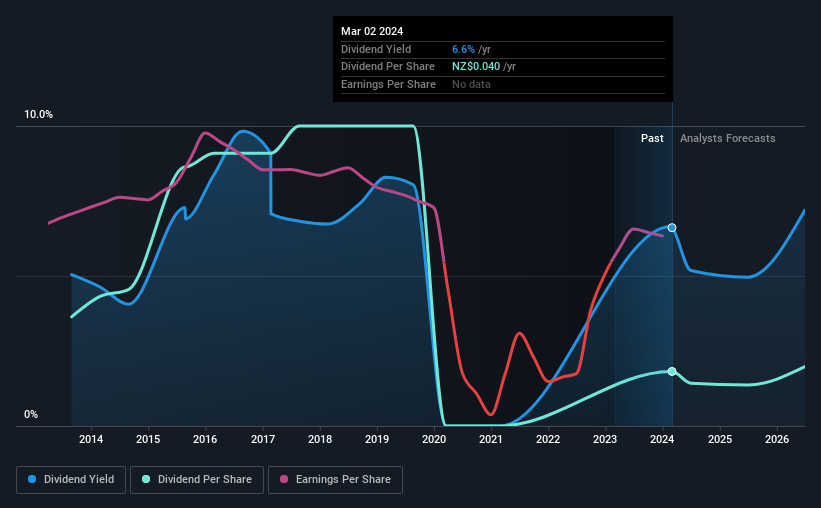Read This Before Considering Air New Zealand Limited (NZSE:AIR) For Its Upcoming NZ$0.02 Dividend
Readers hoping to buy Air New Zealand Limited (NZSE:AIR) for its dividend will need to make their move shortly, as the stock is about to trade ex-dividend. The ex-dividend date is usually set to be one business day before the record date which is the cut-off date on which you must be present on the company's books as a shareholder in order to receive the dividend. It is important to be aware of the ex-dividend date because any trade on the stock needs to have been settled on or before the record date. Accordingly, Air New Zealand investors that purchase the stock on or after the 7th of March will not receive the dividend, which will be paid on the 21st of March.
The company's next dividend payment will be NZ$0.02 per share. Last year, in total, the company distributed NZ$0.04 to shareholders. Based on the last year's worth of payments, Air New Zealand has a trailing yield of 6.6% on the current stock price of NZ$0.605. If you buy this business for its dividend, you should have an idea of whether Air New Zealand's dividend is reliable and sustainable. So we need to check whether the dividend payments are covered, and if earnings are growing.
See our latest analysis for Air New Zealand
If a company pays out more in dividends than it earned, then the dividend might become unsustainable - hardly an ideal situation. Air New Zealand has a low and conservative payout ratio of just 21% of its income after tax. Yet cash flow is typically more important than profit for assessing dividend sustainability, so we should always check if the company generated enough cash to afford its dividend. Fortunately, it paid out only 40% of its free cash flow in the past year.
It's encouraging to see that the dividend is covered by both profit and cash flow. This generally suggests the dividend is sustainable, as long as earnings don't drop precipitously.
Click here to see the company's payout ratio, plus analyst estimates of its future dividends.
Have Earnings And Dividends Been Growing?
When earnings decline, dividend companies become much harder to analyse and own safely. If business enters a downturn and the dividend is cut, the company could see its value fall precipitously. With that in mind, we're discomforted by Air New Zealand's 22% per annum decline in earnings in the past five years. Ultimately, when earnings per share decline, the size of the pie from which dividends can be paid, shrinks.
The main way most investors will assess a company's dividend prospects is by checking the historical rate of dividend growth. Air New Zealand has seen its dividend decline 6.7% per annum on average over the past 10 years, which is not great to see. While it's not great that earnings and dividends per share have fallen in recent years, we're encouraged by the fact that management has trimmed the dividend rather than risk over-committing the company in a risky attempt to maintain yields to shareholders.
Final Takeaway
From a dividend perspective, should investors buy or avoid Air New Zealand? Air New Zealand has comfortably low cash and profit payout ratios, which may mean the dividend is sustainable even in the face of a sharp decline in earnings per share. Still, we consider declining earnings to be a warning sign. Overall, it's not a bad combination, but we feel that there are likely more attractive dividend prospects out there.
In light of that, while Air New Zealand has an appealing dividend, it's worth knowing the risks involved with this stock. Case in point: We've spotted 1 warning sign for Air New Zealand you should be aware of.
If you're in the market for strong dividend payers, we recommend checking our selection of top dividend stocks.
Have feedback on this article? Concerned about the content? Get in touch with us directly. Alternatively, email editorial-team (at) simplywallst.com.
This article by Simply Wall St is general in nature. We provide commentary based on historical data and analyst forecasts only using an unbiased methodology and our articles are not intended to be financial advice. It does not constitute a recommendation to buy or sell any stock, and does not take account of your objectives, or your financial situation. We aim to bring you long-term focused analysis driven by fundamental data. Note that our analysis may not factor in the latest price-sensitive company announcements or qualitative material. Simply Wall St has no position in any stocks mentioned.

